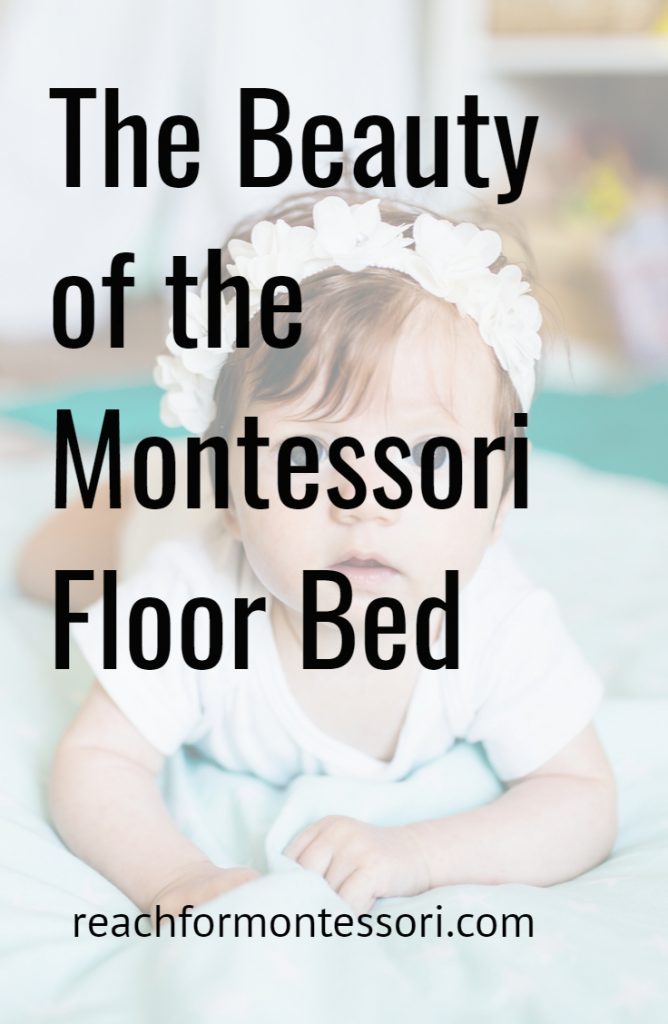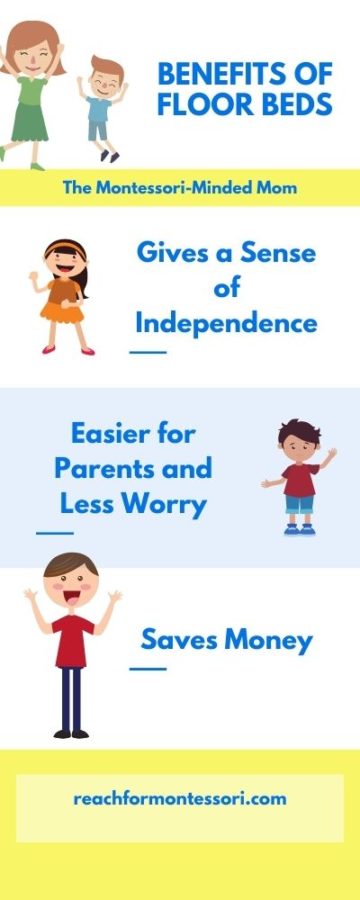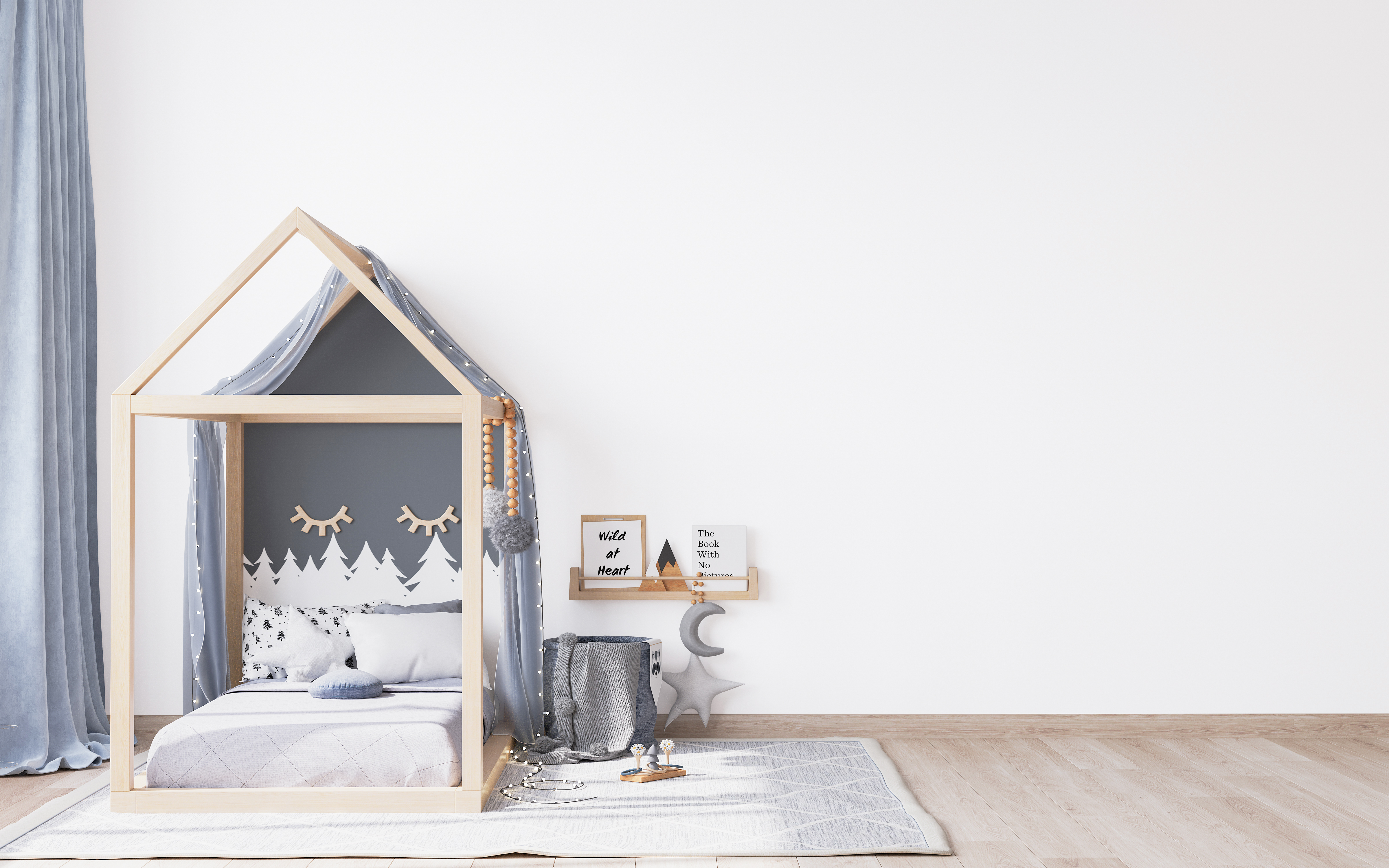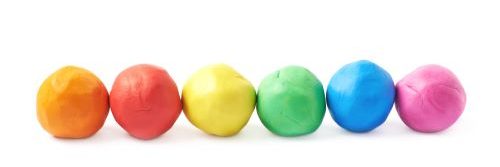If you're new to the Montessori educational method, you might not have heard about the floor bed yet. Or maybe you've heard of them, but aren't sure what they are or what their benefits might be.
The idea of a floor bed was conceptualized by Maria Montessori – the creator of the Montessori method.
We'll take a deep dive into the concept, so you can decide whether it's right for your household.
In this article, I'll attempt to cover all of the things people ask us on a regular basis about our Montessori floor bed, how we navigated bedtimes at each age, and exactly how it's benefited our children
If you're already familiar with the philosophy and benefits of a floor bed, and you're only here looking for recommendations for your child's Montessori bedroom, then you can just jump down to my favorite floor beds.
- What is a Montessori bed (floor bed)?
- What's the philosophy behind the Montessori Floor bed?
- What age is appropriate for a Montessori Bed?
Are Montessori floor beds safe for my child?- Are floor beds good for toddlers?
- What to consider when purchasing a Montessori floor bed
- Why do Montessori beds have a house shape?
- Top 6 Montessori Bed Brands
What is a Montessori bed (floor bed)?
The idea of a floor bed is so foreign to some people that they are legitimately confused about what counts as a “floor bed” according to the Montessori method.
The truth is actually very simple. There are no special requirements needed.
A floor bed is quite literally a bed that's placed on the floor.
With a toddler, you may choose to utilize a floor bed frame or you may simply place the mattress directly on the floor, without a traditional bed frame or a crib.
What’s the purpose of a floor bed?

(This post contains affiliate links. Purchasing from these links costs you nothing extra, but sends a few cents our way for website upkeep.)
The next most common thing people ask about our floor bed is… why? What is the point in using a floor bed?
While a floor bed is a strange concept for many people in the U.S., many other cultures throughout the world use them with great success.
Floor beds align beautifully with the Montessori philosophy because they offer a child freedom of movement, as well as a bit of independence.
Placing your child's bed on the floor allows for free movement without any restriction.
This allows your child to come and go from their own bed when needed rather than being confined.
Although that may seem a bit scary at first, the reality here is that floor beds help children learn to be independent sleepers very early in life.
Contrary to the belief of some, there is no need to have a child sleep in their own room in order to implement a Montessori bed.
Many families choose to have their child's low bed in the same room as the caregivers for added peace of mind.
Some families choose to set up a Montessori nursery and that's ok, too.
What's the philosophy behind the Montessori Floor bed?
Dr. Montessori stressed the idea that children learn in an environment where they are free to explore and secure enough to feel confident – this is one of the cornerstone Montessori principles.
Part of that confidence is linked to a child feeling capable of doing things for themselves. This explains why Maria Montessori emphasized the importance of using child-sized furniture.
In a classroom, that means using smaller shelves, chairs, and tables that children can comfortably use.
But at home, young children should also feel comfortable and capable. Using a floor bed allows your child to access their bed at the time of their own choosing.
This concept also encourages your child to explore their own independence.
It lets them decide when they'll move without needing a parent to lift them out of the crib.
This promotes a feeling of self-reliance and allows them to explore at their own pace.
What is the benefit of a Montessori bed?
Parents always have to weigh the benefits versus risks for their kids. As a new parent, I constantly did.
Here are some benefits both you and your child might see from implementing a floor bed for your child.
It is cheaper: Buying a crib for your child to use for a year or two can be pricey. With a floor bed, all you need is a mattress. So, financially, it can be a big benefit to you.
You won't wake up to a toddler crying from their crib: That's not a pleasant way for either of you to wake up in the morning.
Instead, you can be greeted by your child walking out of their room with a smile on their face, eager to see you.
They won't feel trapped – they'll get to come and go as they please.
It may improve your child's outlook on bedtime: In some households, bedtime is a struggle.
A child doesn't want to go to their crib because they are confined there. They don't have a choice. It's like a cage with legs for them. They may not mind heading off to bed in the evening, though, with their floor bed.
They'll realize they can get up as needed, which gives them a sense of control.
Increased sense of independence: Some children bloom when they are given more freedom to choose what they're going to do next.
Less worry from parents: If you're concerned your child will fall from their crib or roll out of a toddler bed, you might worry less with a floor bed.
They are lower to the ground, so rolling out of them isn't a big deal.

What age is appropriate for a Montessori Bed?
Some people – those dedicated to the Montessori approach from the time their child is born – might use a bassinet or Moses basket for their baby during the first few weeks of their life.
Around the age of 2 months of age or when the baby is a few weeks old is the ideal time to transition to the floor bed. There is no set age.
If possible, you'll want to do it before your baby starts rolling. But some people do decide to wait until their children are toddlers to introduce a floor bed.
Are Montessori floor beds safe for my child?
No method of sleep is ever 100 percent safe for babies and toddlers. Toddlers who sleep in cribs can turn into surprising acrobats as they try to escape the cribs by climbing.
That can lead to children falling out of cribs.
Other babies and toddlers are allowed to sleep in their parents' beds. That can lead to suffocation risks from pillows or from parents rolling over on their children in their sleep and not realizing it.
Plus, children can also get injured from falling out of their parents' beds or even toddler beds.
Likewise, there are a few safety concerns you should be aware of when it comes time to transition to a floor bed. Let's take a look at the main ones.
If you move ahead with your plans for a floor bed, you might get some strange looks from family or friends who've never heard of this alternative or who aren't familiar with Montessori teaching methods. But don't let that stop you!
Rolling Off the Mattress
Once your baby learns how to roll, there is always the risk they'll roll off of their mattress.
But, since their mattress is sitting on the floor, they'll only drop a few inches because children's mattresses are not thick.
But even still, you may worry about your baby hitting its head on a hard floor. If you have a hard floor in their nursery, you can put an area rug underneath the mattress.
If you don't want to put down a rug, you can put a blanket next to the mattress to protect them from rolling off.
If you have carpeting in your baby's nursery, you won't need to put any protection down at all.
Pay Attention to Baby Proofing
Your child won't be trapped in a crib when using a floor bed. That gives them greater freedom.
You need to be careful with hazards, though, by diligently babyproofing certain items. You should make sure to cover any outlets so your child isn't hurt while exploring.
Essentially, your child's sleeping area should be akin to his “ yes spaces ” for play in the home; safe for exploration.
You'll also want to ensure your child's safety by putting up a baby gate on any stairway they can reach.
That way, if they get up in the middle of the night while you're still sleeping peacefully, they won't be injured falling on stairs.
You should do all the other baby proofing you'd normally want to do as well throughout your house.
Make sure medications and household cleaning products are locked away or out of reach.
Sleep safety under 1 year old.
If your child is less than a year old, remember that the American Academy of Pediatrics suggests that babies under 1 year sleep only on a crib mattress rather than an adult mattress.
This is because the mattresses are specifically designed to be a bit firmer so that your infant’s body doesn’t sink down into the mattress as they sleep.
This will allow your little one to breathe fresher air with less chance of rebreathing, which decreases the risk of SIDS.

Admittedly, switching to a floor bed with a toddler can be a bit tricky at first. Your toddler may absolutely love the idea of coming and going from their bed.
In fact, they may love it so much that you have a hard time getting them to actually go to sleep! But isn't that sort of the whole goal?
Are floor beds good for toddlers?
Although sleep is absolutely important, it's also important for your child to have some time to wind down as needed.
Yes, they may crawl in and out of bed a bit. Yes, they may even fall asleep in the middle of the floor, surrounded by their stuffed friends.
But eventually, your toddler will go to sleep. Most of the time, parents are surprised at how simple it is to get a child to start sleeping independently when the child is given the freedom to move around a Montessori-style bedroom.
Of course, there are some things you can do to help promote sleep for our toddlers.
Specifically, implementing a bedtime routine will be invaluable. Over time, the bedtime routine will help signal your child's mind to get sleepy.
Our Floor bed Bedtime routine
Over the years, we’ve developed a fairly consistent routine that helps our kiddos get to bed with little issue. This routine worked for our babies, toddlers, preschoolers, and up!
The best part is that it’s really not overly complicated.
- We start our bedtime routine with a bath.
- Afterward, we lotion up with a little massage.
- Next, they get into their pj's and we deal with hair hygiene.
- Then finally, we read a book and get into bed.
What happens next is up to them. They have the freedom to move in and out of their bed if needed.
Fortunately, their little minds are so familiar with the routine that they are often tired and ready to sleep by the time we leave the room.
What to consider when purchasing a Montessori floor bed
Although the concept is simple, there are definitely a few things you'll want to consider when purchasing a floor bed.
For starters, you'll obviously want to consider the space you're dealing with. If your child's room is particularly small, you would do best to focus on a mattress only or a very simple frame that will take up very little space.
Also, when you start searching for the perfect floor bed, you'll find that there are a lot of options out there. You may want to choose one that's more stylish for your child's room.
However, keep in mind that safety is a huge priority in a Montessori room. If your child is a bit of a climber, you may want to avoid beds that extend upwards, like the cute house frame beds you'll find all over Pinterest.
Why do Montessori beds have a house shape?
To be clear, there is actually no such thing as a “Montessori bed”. Dr. Maria Montessori did not actually conceptualize low beds.
People have been sleeping on beds low to the floor since the dawn of man.
House beds are not necessarily Montessori, nor are they even necessary.
House frames are simply a floor bed design that looks nice and fits the aesthetic of many Montessori-inspired sleep spaces.
Top 6 Montessori Bed Brands
After having spent years using floor beds, we’ve definitely found a few beds that we love (and a few that we don't).
Ultimately, every family will have their own preferences for which floor bed is perfect for their home, but here are a few that we’ve found to work really well for Montessori families.
Montessori House Bed with Rails
This is an adorable Montessori house bed with rails that comes in all of the different mattress sizes.
This bed comes in crib, twin, and full size and is made with solid pine wood – super sturdy.
The design is soft and classic.
No products found.
White Picket Fence House Bed
For the fairy-tale lover, this white picket fence bed is an adorable addition to your little one’s room.
This is a really fun design with the added safety feature of the “fence”.
You have a choice of 3 colors with this bed option, as well as 2 sizes – twin and full.
This bed is Children's Product Certificate (CPC), so that's a great feature for those concerned about the safety of the wood.
Montessori floor bed with rails
The company featured below makes some of the most sturdy and beautifully designed floor beds. Here is their gated bed.
It's the same basic concept as a crib, but allows for a bit more freedom. This is a great option for those that are hesitant to give floor beds a try.
House bed with thick frame
This bed is also a great option for parents looking to go “all in” and get a bed that allows for complete freedom.
Slightly Raised House Bed
Also cute but a little simpler, this Montessori house bed is so sweet. It is not directly on the floor, which makes this a good choice for toddlers that are ready for a “big kids” bed.
- 【Roof Design】Featuring roof, this unique bed creates a fun…
- 【A Better Sleeping Environment】Thanks to the semi-enclosed…
- 【Space-saving】Not only two drawers,there is a shelf…
If you're looking for a simple twin floor bed style, this one is the perfect option.
If you’re looking for something even simpler, you can check out the sprout kids website for their beautifully simple take on the floor bed.
Cheers and don't forget to subscribe!






Pingback: Parenting from the Floor – Dani Izzie
Do you recommend buying one or building one your self? They don’t look hard to build.
Also what about safety when using them?
My son just turned 1 year and I am thinking of transitioning him to a floor bed but unsure if it is too late, as his interest will be to explore? Or just go ahead with it and expect a couple days of regression? Should I sleep with him in the room until he is comfortable?
I heard a parent offer this insight once- that if the child moves around their bedroom to explore or play, they will still get tired and fall asleep. If they have not made it back to their bed before they fall asleep, they will sleep on the floor and it will not be comfortable. So in the future, they will learn to move back to the bed before falling asleep. As far as if you should sleep with him at first, you know your little one best. Will that make him feel more safe with the change? You can always start with him there and adapt based on how he reacts.
Are there specific things to look for when choosing a mattress for an infant?
Something hypoallergenic and breathable is what you want. It’s important to note that the same safe sleep rules apply to mattresses whether they are on the bed or the floor. Nothing too soft and always tested and certified safe for baby sleep.
We live in a pretty cold country/area. Our main concern when thinking about using a floor bed is that at the floor level is much colder than at the adult-bed level.
Our LO is now 18 months. Before her 12 months we used for a while a “floor bed” (basically a mattress on the floor), but we moved her to our bed (co-sleeping) at some point when she got a nasty cold. Since then we are hesitant to go back to the mattress on the floor.
We realize that the floor bed was invented by Maria Montessori when she was in the warm Italy. But how to deal with it in Northern countries?
What are your suggestions about dealing with the colder temperatures at the floor-level?